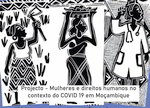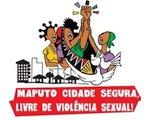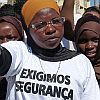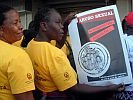The significance of widowhood for women
by Eulália Temba
With this presentation1 we wish to contribute to the debate in response to AMMCJ’s report on the situation of widows in Mozambique. From 1992 to 1998, WLSA Mozambique carried out research into issues related to women and the law. During this period a study was made into widows’ awareness of the law, their position regarding inheritance and the way in which women are represented regarding rights of succession.
This paper summarises the information about widowhood that was gathered during this period of research as well as observations made and information gathered at a later date.
The study covers the two most common kinship systems in the country – the matrilineal system existing in some parts of Nampula province and the patrilineal one in the provinces of Maputo and Gaza. Our target group includes widows and widowers of various ages whose marriages were celebrated in registry offices or in traditional marriage ceremonies (lobolo) as well as the widows of polygamous marriages.
Knowledge of the Law
Our interviewees were completely unaware of the succession law and very few had appealed to legal institutions to resolve conflicts concerning property inheritance.
In the southern region of the country, the 39 women we interviewed who had suffered from the unjust distribution of property informed us that they wanted to demand their inheritance rights through legal channels.
According to information provided by key informants, women do not generally present their inheritance problems before the court (in this case the Community Court), simply because they are unaware that they have the right to do so. One informant told us that, ‘in the suburbs there is no information that tells women that when they have problems, conflicts over inheritance, they should act in this or that way. Even women who aren’t widows, when they have problems with their husbands, they pack up their things and leave, not knowing that they could make a complaint.’
In matrilineal areas it was also found that most of our interviewees, both male and female, were totally ignorant of the law.
We found that besides the women’s lack of information about the law, there is another limitation that prevents them from enjoying equal rights to men as stipulated in the laws of succession. We are referring to the use of the legal term ‘head of household’ in the Civil Code, which stipulates that the man is the dominant partner. The use of this term in the legal system causes discrimination against women before the law2.
There are various customs related to succession that should be taken into consideration. These include the practice of levirate whereby a man may be obliged to marry his brother’s widow, the practice whereby a widower may take his sister-in-law as his wife and purification rituals. These are all expressions of a patriarchal model that is reproduced through traditional education and various other practices, particularly of a religious nature.
Traditional Practices associated with Widows
In the framework of cultural values that arise from cultural norms, it is believed that death is associated with malign forces and that the widow or the whole family require special treatment. In patrilineal areas this treatment is known as kubassisa while in matrilineal areas one of the more common terms is namurapi.
According to our informants, these rituals exist in both matrilineal and patrilineal systems and are all based on the following beliefs:
- Death causes a dangerous state of impurity that affects the community and makes the widow or widower susceptible to misfortune.
- The widow or widower has to be purified in order to prevent misfortune in his or her future life. Such misfortunes might include children’s illness or, if she remarries, the widow’s sterility or domestic difficulties in her new home.
Our research showed that purification rituals are very often used as tests to prove the widow’s ‘guilt’ in the death of her husband. For example, one of the widows we interviewed told us that, ‘The ceremony was directed by the elders of my husband’s family. They tied me with a black cloth and I had to stand with my legs open in front of a fire. If I urinated I would not be held responsible for my husband’s death, but if I did not, I would be held guilty’.
Widowhood is more difficult for women than for men. The death of a husband is very often believed to be the result of witchcraft instigated by the wife to kill her husband so that she can keep his property. Once again it is evident that people believe witches to be female. Women have to remain as widows for their entire lives as the patriarchal cultural model creates various constraints that prevent widows from remarrying and leading normal lives. These practices are still very common and constitute violence against women and a violation of women’s human rights.
We did not encounter a single case of a husband standing accused of his wife’s death. It is worth mentioning here that even men who murder wives are not severely punished. In many cases women are still subordinate to their husbands and are viewed as an object belonging to the male.
The patriarchal cultural model that predominates in our society, using as a pretext the preservation of the property left by the deceased person, is an open and cruel instance of the violation of women’s rights. One should not be surprised that some women also seem to lead public accusations against other women, reinforcing the belief that many women are responsible for their husbands’ deaths. It is one more manifestation of how women have appropriated this model though a process of socialisation. It is often women who are the most violent proponents of this cultural model.
We need to alert the women’s movement to these extremely common occurrences that need to be halted. We believe that legal reform in itself will not bring about change. Education should be used as an extremely important means of socialisation. Women’s organisations could also organise educational programmes and debates between women and men to end these oppressive practices.
Endnotes:
- This text was prepared in 1998 to be presented in a debate on the situation of widows organised by AMMCJ (the Association of Female Legal Professionals). The material used was gathered during a research project into the system of legal administration in Mozambique.
- With the approval of the new Family Law this year, the term ‘head of household’ was eliminated. Instead such a person is to be known as the ‘family representative’ who can be either male or female according to the couple’s wishes.







 Information in English
Information in English



















